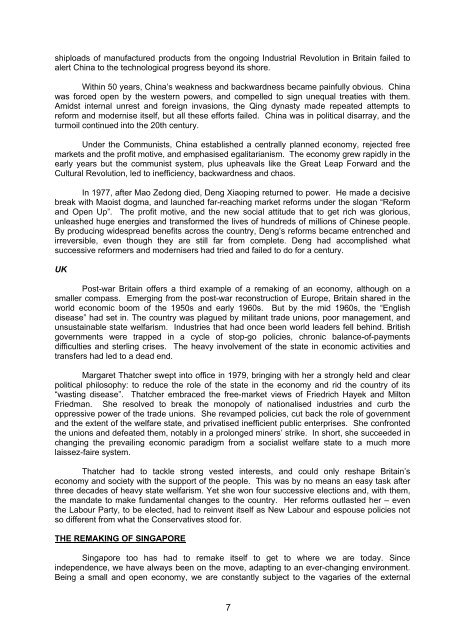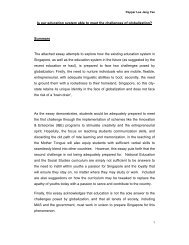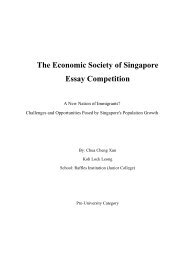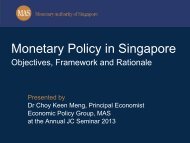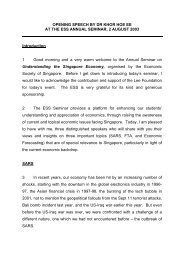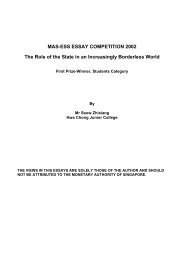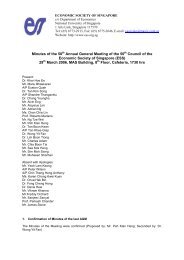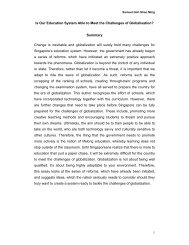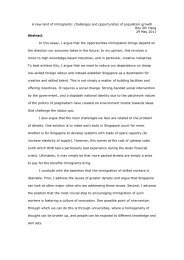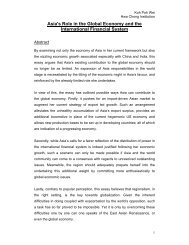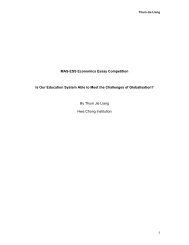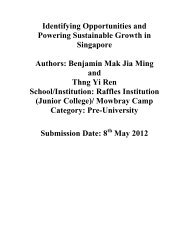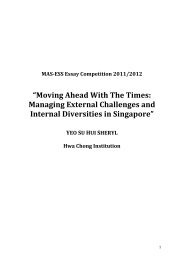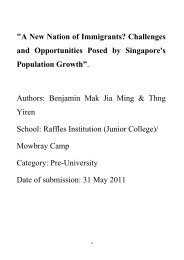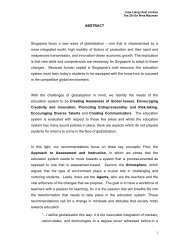the role of the state in an increasingly borderless world - Economic ...
the role of the state in an increasingly borderless world - Economic ...
the role of the state in an increasingly borderless world - Economic ...
- No tags were found...
You also want an ePaper? Increase the reach of your titles
YUMPU automatically turns print PDFs into web optimized ePapers that Google loves.
shiploads <strong>of</strong> m<strong>an</strong>ufactured products from <strong>the</strong> ongo<strong>in</strong>g Industrial Revolution <strong>in</strong> Brita<strong>in</strong> failed to<br />
alert Ch<strong>in</strong>a to <strong>the</strong> technological progress beyond its shore.<br />
With<strong>in</strong> 50 years, Ch<strong>in</strong>a’s weakness <strong>an</strong>d backwardness became pa<strong>in</strong>fully obvious. Ch<strong>in</strong>a<br />
was forced open by <strong>the</strong> western powers, <strong>an</strong>d compelled to sign unequal treaties with <strong>the</strong>m.<br />
Amidst <strong>in</strong>ternal unrest <strong>an</strong>d foreign <strong>in</strong>vasions, <strong>the</strong> Q<strong>in</strong>g dynasty made repeated attempts to<br />
reform <strong>an</strong>d modernise itself, but all <strong>the</strong>se efforts failed. Ch<strong>in</strong>a was <strong>in</strong> political disarray, <strong>an</strong>d <strong>the</strong><br />
turmoil cont<strong>in</strong>ued <strong>in</strong>to <strong>the</strong> 20th century.<br />
Under <strong>the</strong> Communists, Ch<strong>in</strong>a established a centrally pl<strong>an</strong>ned economy, rejected free<br />
markets <strong>an</strong>d <strong>the</strong> pr<strong>of</strong>it motive, <strong>an</strong>d emphasised egalitari<strong>an</strong>ism. The economy grew rapidly <strong>in</strong> <strong>the</strong><br />
early years but <strong>the</strong> communist system, plus upheavals like <strong>the</strong> Great Leap Forward <strong>an</strong>d <strong>the</strong><br />
Cultural Revolution, led to <strong>in</strong>efficiency, backwardness <strong>an</strong>d chaos.<br />
In 1977, after Mao Zedong died, Deng Xiaop<strong>in</strong>g returned to power. He made a decisive<br />
break with Maoist dogma, <strong>an</strong>d launched far-reach<strong>in</strong>g market reforms under <strong>the</strong> slog<strong>an</strong> “Reform<br />
<strong>an</strong>d Open Up”. The pr<strong>of</strong>it motive, <strong>an</strong>d <strong>the</strong> new social attitude that to get rich was glorious,<br />
unleashed huge energies <strong>an</strong>d tr<strong>an</strong>sformed <strong>the</strong> lives <strong>of</strong> hundreds <strong>of</strong> millions <strong>of</strong> Ch<strong>in</strong>ese people.<br />
By produc<strong>in</strong>g widespread benefits across <strong>the</strong> country, Deng’s reforms became entrenched <strong>an</strong>d<br />
irreversible, even though <strong>the</strong>y are still far from complete. Deng had accomplished what<br />
successive reformers <strong>an</strong>d modernisers had tried <strong>an</strong>d failed to do for a century.<br />
UK<br />
Post-war Brita<strong>in</strong> <strong>of</strong>fers a third example <strong>of</strong> a remak<strong>in</strong>g <strong>of</strong> <strong>an</strong> economy, although on a<br />
smaller compass. Emerg<strong>in</strong>g from <strong>the</strong> post-war reconstruction <strong>of</strong> Europe, Brita<strong>in</strong> shared <strong>in</strong> <strong>the</strong><br />
<strong>world</strong> economic boom <strong>of</strong> <strong>the</strong> 1950s <strong>an</strong>d early 1960s. But by <strong>the</strong> mid 1960s, <strong>the</strong> “English<br />
disease” had set <strong>in</strong>. The country was plagued by milit<strong>an</strong>t trade unions, poor m<strong>an</strong>agement, <strong>an</strong>d<br />
unsusta<strong>in</strong>able <strong>state</strong> welfarism. Industries that had once been <strong>world</strong> leaders fell beh<strong>in</strong>d. British<br />
governments were trapped <strong>in</strong> a cycle <strong>of</strong> stop-go policies, chronic bal<strong>an</strong>ce-<strong>of</strong>-payments<br />
difficulties <strong>an</strong>d sterl<strong>in</strong>g crises. The heavy <strong>in</strong>volvement <strong>of</strong> <strong>the</strong> <strong>state</strong> <strong>in</strong> economic activities <strong>an</strong>d<br />
tr<strong>an</strong>sfers had led to a dead end.<br />
Margaret Thatcher swept <strong>in</strong>to <strong>of</strong>fice <strong>in</strong> 1979, br<strong>in</strong>g<strong>in</strong>g with her a strongly held <strong>an</strong>d clear<br />
political philosophy: to reduce <strong>the</strong> <strong>role</strong> <strong>of</strong> <strong>the</strong> <strong>state</strong> <strong>in</strong> <strong>the</strong> economy <strong>an</strong>d rid <strong>the</strong> country <strong>of</strong> its<br />
“wast<strong>in</strong>g disease”. Thatcher embraced <strong>the</strong> free-market views <strong>of</strong> Friedrich Hayek <strong>an</strong>d Milton<br />
Friedm<strong>an</strong>. She resolved to break <strong>the</strong> monopoly <strong>of</strong> nationalised <strong>in</strong>dustries <strong>an</strong>d curb <strong>the</strong><br />
oppressive power <strong>of</strong> <strong>the</strong> trade unions. She revamped policies, cut back <strong>the</strong> <strong>role</strong> <strong>of</strong> government<br />
<strong>an</strong>d <strong>the</strong> extent <strong>of</strong> <strong>the</strong> welfare <strong>state</strong>, <strong>an</strong>d privatised <strong>in</strong>efficient public enterprises. She confronted<br />
<strong>the</strong> unions <strong>an</strong>d defeated <strong>the</strong>m, notably <strong>in</strong> a prolonged m<strong>in</strong>ers’ strike. In short, she succeeded <strong>in</strong><br />
ch<strong>an</strong>g<strong>in</strong>g <strong>the</strong> prevail<strong>in</strong>g economic paradigm from a socialist welfare <strong>state</strong> to a much more<br />
laissez-faire system.<br />
Thatcher had to tackle strong vested <strong>in</strong>terests, <strong>an</strong>d could only reshape Brita<strong>in</strong>’s<br />
economy <strong>an</strong>d society with <strong>the</strong> support <strong>of</strong> <strong>the</strong> people. This was by no me<strong>an</strong>s <strong>an</strong> easy task after<br />
three decades <strong>of</strong> heavy <strong>state</strong> welfarism. Yet she won four successive elections <strong>an</strong>d, with <strong>the</strong>m,<br />
<strong>the</strong> m<strong>an</strong>date to make fundamental ch<strong>an</strong>ges to <strong>the</strong> country. Her reforms outlasted her – even<br />
<strong>the</strong> Labour Party, to be elected, had to re<strong>in</strong>vent itself as New Labour <strong>an</strong>d espouse policies not<br />
so different from what <strong>the</strong> Conservatives stood for.<br />
THE REMAKING OF SINGAPORE<br />
S<strong>in</strong>gapore too has had to remake itself to get to where we are today. S<strong>in</strong>ce<br />
<strong>in</strong>dependence, we have always been on <strong>the</strong> move, adapt<strong>in</strong>g to <strong>an</strong> ever-ch<strong>an</strong>g<strong>in</strong>g environment.<br />
Be<strong>in</strong>g a small <strong>an</strong>d open economy, we are const<strong>an</strong>tly subject to <strong>the</strong> vagaries <strong>of</strong> <strong>the</strong> external<br />
7


